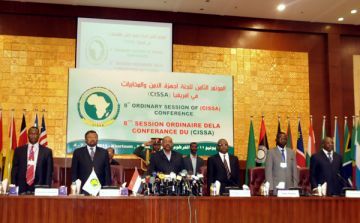Africa Spy chiefs conference begins in Sudan’s capital
June 6, 2011 (KHARTOUM) – The eight ordinary session of the Committee of Intelligence and Security Services of Africa (CISSA) conference commenced on Monday in the Sudanese capital Khartoum, receiving an address by President Al-Bashir who promised to recognize the independence of South Sudan.

In his address, Atta expressed hope that the outcome of the conference would unify views on the challenges facing the African continent. He further said that Sudan is proud of what it accomplished for its neighbors, saying that his country had helped Uganda in fighting the Lord Resistance Army (LRA) rebels and dismantled Chadian opposition groups.
Sudan president Omar Al-Bashir also addressed the CISSA’s conference, striking a conciliatory tone towards South Sudan as it approaches independence in July this year.
“We have realized peace in South Sudan, and we paid its dues which resulted in the creation of a new entity in Africa, and we will be the first to welcome and cooperate with the new nation” Al-Bashir said.
North and South Sudan, which voted to secede and form an independent state under a 2005 peace deal that ended decades of civil wars with the north, are currently at loggerheads over the border region of Abyei in which tension escalated after it was seized by the northern army earlier this month.
Meanwhile, CISSA chairperson and intelligence chief of Congo Brazzaville, Philip Obara, said in his address to the conference that African countries had been in the position of bystanders towards the events in Libya, allowing the international community to make all the decisions.
He also called on African countries to use dialogue not force to protect themselves, warning that the reasons that led to uprisings in Tunis and Egypt do exist in all countries.
(ST)
